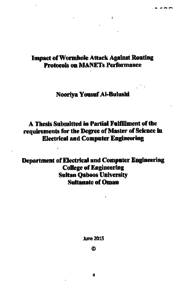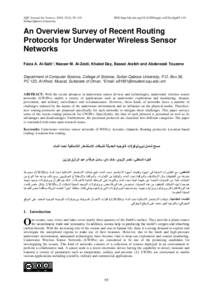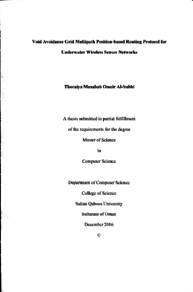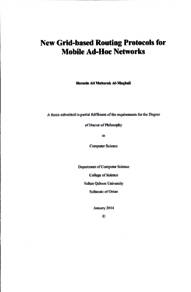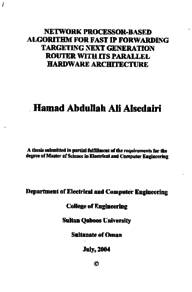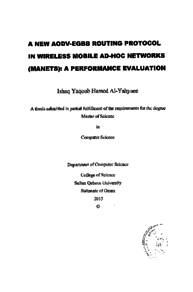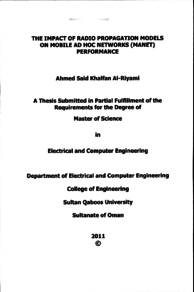Document
Impact of wormhole attack against routing protocols on MANETs performance
Publisher
Sultan Qaboos University
Gregorian
2015
Language
English
Subject
English abstract
Mobile Ad hoc Networks (MANETs) have received growing research interests over the past years due to their numerous useful applications such as emergency situations and military applications. Since nodes communicate with each other without an infrastructure, they provide the connectivity by forwarding packets over themselves. To support this connectivity, nodes use a routing protocol such as Ad-hoc On Demand Distance Vector (AODV) and Optimized Link State Routing (OLSR). Due to security vulnerabilities in the routing protocols, wireless ad-hoc networks are unprotected from attacks executed by colluding malicious nodes such as wormhole attack. In a wormhole attack, two colluding malicious nodes could capture packets from one end of the network and send them through a tunnel to be relayed in the other end of the network. This confuses legitimate nodes into sending their packets through the wormhole tunnel. The malicious nodes can then drop or manipulate the packets passing through the wormhole tunnel to their advantage. The goal of this thesis is to compare the severity of the wormhole attack on MANETS performance when AODV and OLSR are used as routing protocols. We consider both static wormhole attack and mobile wormhole attack. The network simulator NS-3 has been used to evaluate the performance of AODV and OLSR under different scenarios. Our simulation results indicate that OLSR is more robust to wormhole attack compared to AODV. Performance metrics such as packet delivery ratio, normalized routing overhead, and throughput exhibit better values using OLSR than with AODV. On the other hand, our analysis shows that there is no significant difference between the static and mobile wormhole attacks in terms of their impact on MANETS performance.
Description
Thesis
Member of
Resource URL
Arabic abstract
قد تلقت الشبكات المتنقلة MANET اهتمامات بحثية متزايدة خلال السنوات الماضية بسبب العديد من تطبيقاتها المفيدة مثل حالات الطوارئ والتطبيقات العسكرية. العقد تتواصل مع بعضها البعض من دون بنية تحتية عن طريق إعادة توجيه الحزم على بعضهم البعض. لدعم هذا الربط، تستخدم العقد بعض بروتوكولات التوجيه مثل متجه المسافة المخصص عند الطلب (AODV ومحسن حالة ارتباط التوجيه (OLSR). بسبب الثغرات الأمنية لبروتوكولات التوجيه، الشبكات اللاسلكية المتنقلة غير محمية من الهجمات التي تنفذها العقد الخبيثة بالتواطؤ مثل الهجوم الثقب. في هجوم النقب، العقد الخبيثة تتواطؤ للقبض على الحزم من واحدة من نهايات الشبكة وإرسالها عبر نفق إلى الطرف الآخر من الشبكة. هذا يدفع العقد المشروعة إلى إرسال حزم من خلال نفق الثقب حيث يعتقد أن النفق يوفر طريقا أقصر إلى أي وجهة. العقد الخبيثة يمكن أن تتلاعب بالحزم التي تمر عبر نفق القناة لصالحها الهدف من هذا البحث هو دراسة شدة تأثير هجوم النقب على أداء الشبكة عندما يتم استخدام بروتوكولات التوجيه AODV وOLSR. ونحن ناخذ في الاعتبار كل من هجوم الثقب الثابت وهجوم النقب المتنقل. وقد تم استخدام جهاز محاكاة الشبكات 3-NS لتقييم أداء AODV و OLSR تحت سيناريوهات مختلفة. نتائج الأداء لدينا تشير إلى أن OLSR يمكنه التعامل مع هجوم النقب بشكل أفضل بكثير من AODV .مقاييس مثل نسبة تسليم الحزمة، تطبيع فوق التوجيه و الإنتاجية تظهر الكثير من التحسن باستخدام OLSR من مع AODV. من ناحية أخرى، يظهر تحليلنا أنه لا يوجد فرق كبير بين هجمات الثقب الثابتة والمتنقلة من حيث تأثيرها على أداء الشبكة.
Category
Theses and Dissertations

